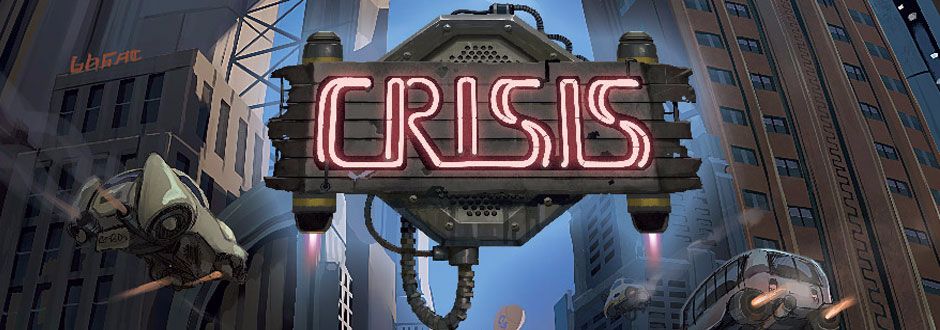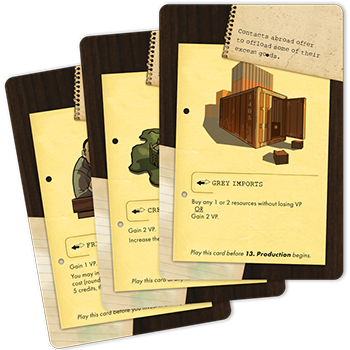
Crisis
Backorder Item Notice
Please note the expected date shown above is a guideline only. Backorder items will typically arrive within the next 2 months, however, in some instances they may take longer. Any orders that contain a Backorder Item will not be dispatched until all items in the order are available. Please keep this in mind before you place any orders that contain both in-stock and Backorder items. Please place a separate order to receive in-stock item(s) sooner!
We unfortunately cannot guarantee that restock/pre-order lines will arrive by Christmas.
For more information please see our Backorder FAQs.
Related Products
Description
Axia — a land with a glorious past, a most uncertain present, and an even more unpredictable future. Populated by what has been described as a fervent and warm-blooded people, Axia is in crisis – economic, social, and political: the longest-running recession in its modern history, the highest inequality in years, and a political system teetering on the brink of collapse.
In more ways than one, Axia is fighting against itself. Old divisions of the past have given way to new ones, and this generation – along with the next ones – has the most to lose.
Will you, along with your fellow industrialists, do your part to help Axia? Will you sacrifice short-term gain in the present for a brighter future? Can you do that, and survive? Perhaps you can, and perhaps you can even thrive – and you will, if you see opportunity where others only see crisis!
CRISIS is a turn-based game for 1-5 players who assume the roles of businessmen, trying to rebuild their businesses and create value at a particularly challenging time. By skillfully placing their managers in a position to invest in companies, trade resources, and navigate the local bureaucracy and regulations, they can thrive and prosper in a time when others might struggle and decline.
- Age 14+
- 1-5 players
- 45-120 minutes playing time

The creators of Crisis came up with a nice backstory: the country of Axia had a “glorious past”, but an “uncertain future” thanks to a long running recession, financial trauma and a political system on the edge of collapse.
In the game you are cast as industrialists and business people who have to drag Axia’s economy back from the edge, all while competing among yourselves and against the demands of the wider, richer world who are forcing you into economic straitjackets. All of which is a nice background, but it masks something, to my mind, far more interesting.
This Seems Familiar…
The thing is, designers Pantelis Bouboulis and Sotirios Tsantilas come from Greece, a statement which might have made you go ooooooh. In the last decade Greece, a country with a glorious past, experienced a financial crisis that many internally felt was exacerbated by the actions of the international community demanding things of the nation.
We don’t need a full break down of what happened in Greece, but when you play Crisis you get the strongest feeling you are playing a giant metaphor for real life, a game born of real world frustration, a challenge based partly on events. Crisis was already a fine game, and using Axia will draw in more people than if it had Greece written on it, but to me it explains things and makes the challenges all the more interesting.
How To Play Crisis
The first thing you do each turn is draw an event card from one of three decks, and we’ll return to this in a minute. At its heart, Crisis is a worker placement game. Players alternate in placing their action meeples on the board, and different positions mark out different events: buy a business, hire workers from inside the country or abroad, get loans or government grants, buy resources from internal and external markets, a whole range of business themed choices.
But here’s the wrinkles: the actions aren’t taken when you place the meeple, but only when everyone has placed everything, and then in the order actions are listed on the board. So, you can also take your loan before you buy your business, even if you played a meeple on the business first to lock it up. In addition, some positions only have room for one player to claim them, so if you don’t get the internal market first you’re looking at costly alternatives.





Business, and workers, are drawn from a deck and always change, so what will you go for first, the top quality staff member or the business they can run? When you get to a production section on the master board your businesses do their stuff, but have you supplied and chained them right?
For instance, your farm might produce food, but only if you have power for it, so do you have a power station in your possession, or did you buy enough energy from the foreign market? After production, with goods being stored in your warehouse, you can sell your products to an ever changing foreign market, gaining cash and victory points. There isn’t the same amount of options each turn as an Agricola, but there is something else that needs to be said…
Fighting, Fighting, Fighting
All good, but all quite usual. So here’s the big twist: the country is under pressure from other nations to meet finance targets, and at the start of the game you select a target plan. For instance, by the end of the third turn, every player must have reached 25 victory points or else the economy and political situation in the nation weakens, and you lose points on a tracker which monitors your chance of surviving without some sort of economic collapse and war.
For every victory point you are off, the track declines and the position of the track determines both the type of event card you draw and whether the game continues: get to the bottom of the red disaster zone, and it’s game over, best hope you’ve got something to barter. This is the beauty and the horror of Crisis: not only are you competing in a worker placement game to build a functioning business empire, all the players are struggling against the odds to stave off economic doom, and when things start going badly they keep going badly. The result is similar to Pandemic in the feeling you’re fighting against a tsunami. This is called Crisis for a reason.
Does that sound fun? People I’ve played it and enjoy it, but this is where the history comes in: you get a feeling that, in some small way, this is what it feels like to be in a country where the economy is being battered and in turn controlled by outside influences. Not since Rome: Total War have I felt a game use, well, a game to so well reproduce an actual sensation. You can play it solo, and while I’ve played with small numbers it can sit up to five players to make the carnage greater.
In terms of production values, the main board is nice to look at and heavy, and the version with lots of wooden pieces is tactile. For a game with so many small elements it’s great, because your power resources are small yellow lightning bolts and your bread is little slices of toast, but there’s still a lot of card counters. Difficulty is above average, as there’s quite a few systems, and the challenge is stiff with lots of options meaning you can’t do everything.
The foreign countries setting your victory point goals also have a range you can choose from, and this is the difficulty setting: and trust me, it can be very difficult. The designers have admitted they struggle with the top level.
Final Thoughts
Crisis has been criticised for not having enough options each turn, which I’d disagree with because there is still enough for a good game and a tightly constructed situation that needs to be solved. If you didn’t know about the influences of Crisis you can still play a wonderful worker placement game with strong economic themes in a sci-fi future. But to me, the sense of tension and frustration and struggle in this amps up when you know where the game came from.
Crisis isn’t an above average game, it’s an experience I wish more people had for when they considered the world, and one they might very well really enjoy.
Zatu Score
You might like
- An authentic feeling of struggle.
- Different difficulty levels.
- Smart presentation.
- Politics dont overwhelm.
Might not like
- Has been criticised as too narrow.
- Even the designers struggle with hardest setting.


